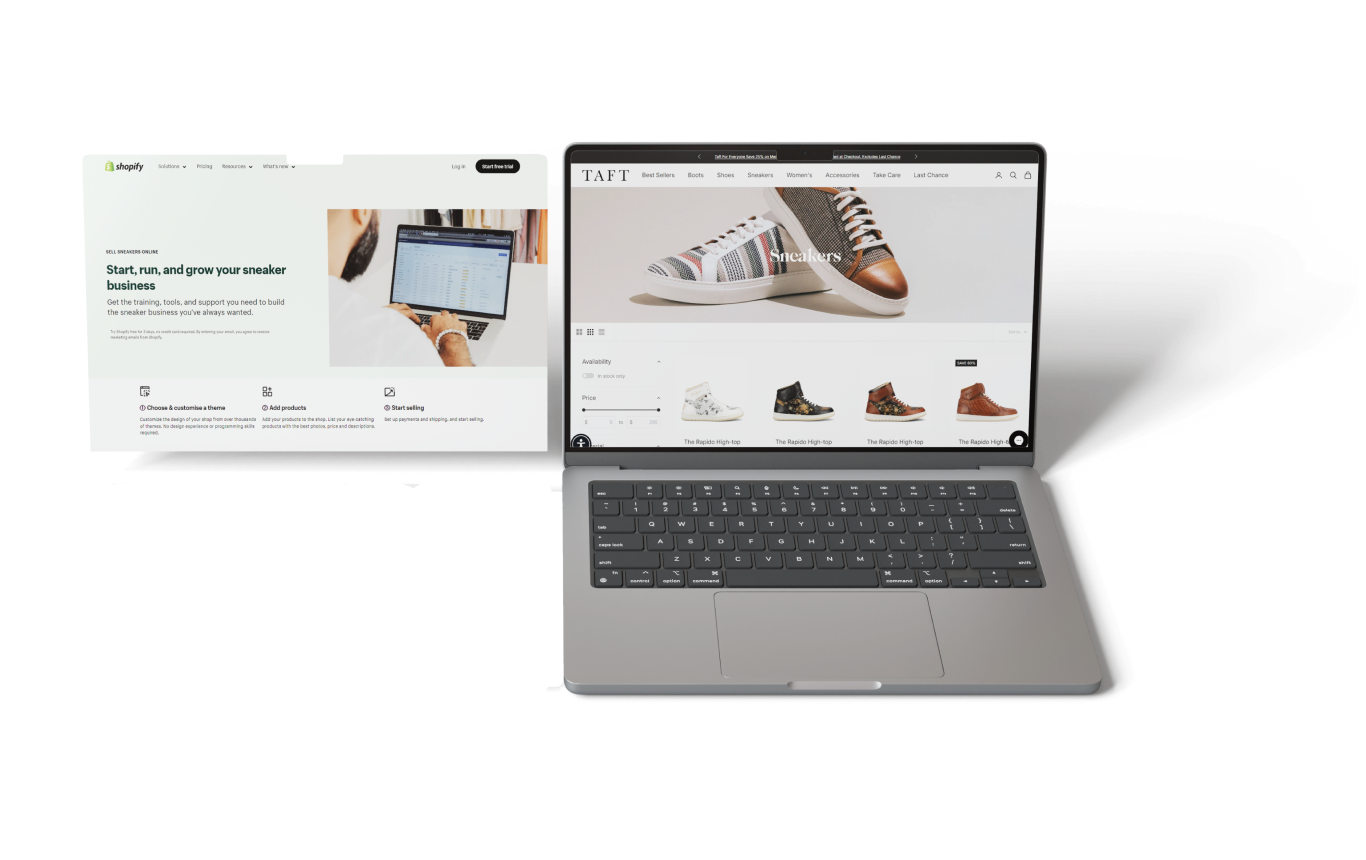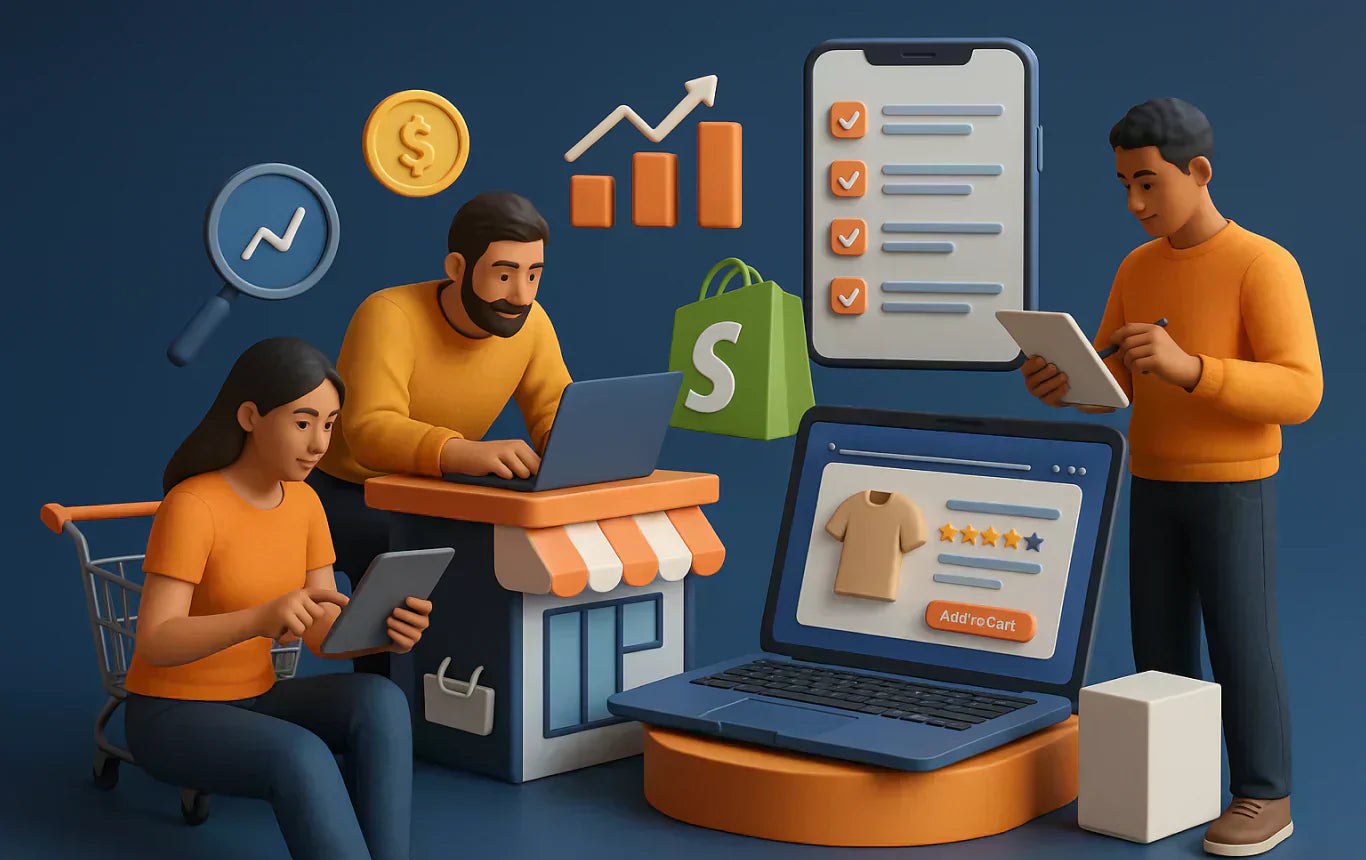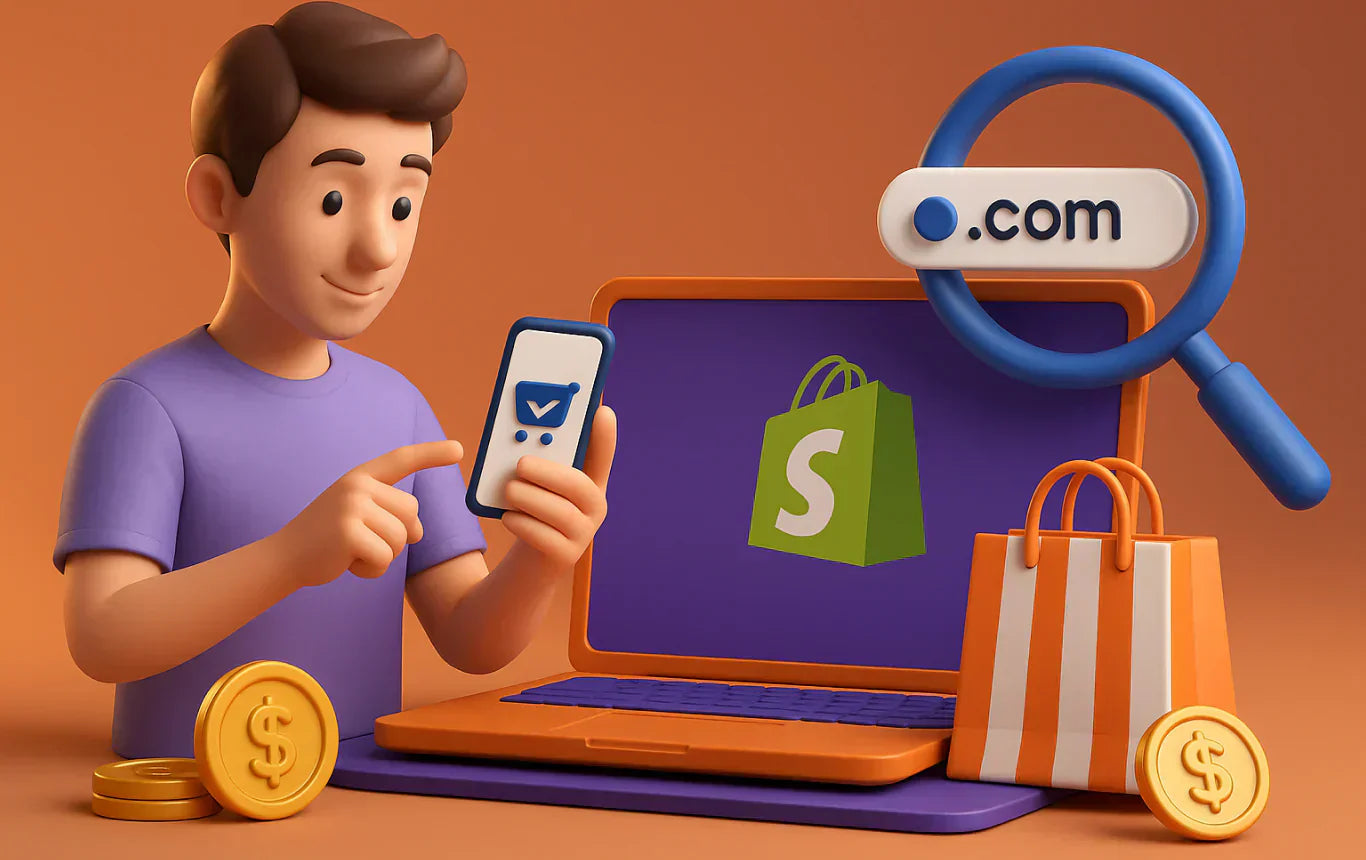Table of Content
The global sneaker market has exploded, with sneakerheads, casual customers, and fashionistas continuously demanding unique designs, limited editions, and daily wear. If you want to sell trainers online and have been thinking of breaking into this growing sector, you have made the correct decision.
Shopify acts as a great platform for launching your sneaker brand. From opening your store to marketing your products, our thorough guide will walk you through every phase of the process on how to effectively sell sneakers online with Shopify.
Why Choose Shopify To Sell Sneakers?
As one of the most well-known and user-friendly e-commerce platforms, Shopify allows businesses to create online stores without owning any technological knowledge. When it comes to selling sneakers online, Shopify provides a range of advantages:
- Simple Interface: Its drag and drop builder helps you easily design your store.
- Mobile Optimization: Given most sneaker buyers shop on their phones, Shopify guarantees your store looks great on mobile devices.
- Wide Payment Options: Shopify accepts a broad spectrum of payment options, including Apple Pay, PayPal, and credit cards.
- Built-In Marketing Tools: From social media integration to SEO optimization, Shopify has built-in tools to enable you to market your products easily.
- Scalability: Shopify can scale depending on your business needs, regardless of size, whether you’re starting out small or even if you run a global sneaker empire.
Let’s now get you up to speed on the steps you need to take to successfully launch your sneaker brand and sell sneakers online with Shopify.
Narrow Down Your Niche and Conduct Market Research
Knowing who you want to sell sneakers online to is the first step in successfully selling sneakers. Given the large and fiercely competitive sneaker market, finding a niche and jumping on it will help your store stand out. Below are a few options you should consider becoming particularly specialized in:
- Luxury trainers: for upscale and brand conscious consumers.
- Limited edition sneakers: Targeted at sneaker collectors, experts, and enthusiasts.
- Eco-friendly trainers: for consumers with environmental concerns.
- Preowned or vintage trainers: targeted to trends in sustainability and nostalgia.
Once you have chosen a niche, conduct research to understand the market. Learn what's trending, what sneaker models are in demand, and what pricing policies work best; use tools including Google Trends, social media channels, and sneaker market gaps.
Set Up & Launch Your Shopify Store
Now that you have your niche picked out, it's time to build your Shopify store. Here are detailed instructions on how you can build your Shopify store.
Sign Up For Shopify
- Visit the Shopify website to sign up to create an account.
- Select a pricing plan fit for your current business needs. Shopify provides a free trial so you can try out before picking a plan in haste.
Select A Domain Name
- Your domain name should be connected to your niche and be catchy and easily memorable. For high end sneakers, for instance, a name like "Luxury Sneaks" might be fitting.
- Shopify lets you buy your domain directly from its system.
Choose A Shopify Theme
- You can find easy to customize and mobile optimized free and paid themes available from Shopify’s theme store.
- Choose an aesthetically pleasing theme that accentuates your brand voice and image.
- Make sure the design improves the experience for customers who want to quickly browse your products.
Personalize Your Store
Match your theme to the look of your brand. Check that your website doesn’t fall short on the following aspects:
- Provides a flawless browsing experience.
- Clear product pages with high quality product images and thorough descriptions.
- Make sure product pages load fast, especially on mobile.
Stock Items On Your Store
When adding your stock of sneakers to your store, make sure you have high-quality images and well detailed product descriptions. Sneakerheads pay great attention to the details, and so your product listings should be bustling with relevant information.
Create Product Descriptions
Describe the features and advantages of every sneaker model. Emphasize on:
- Material (such as synthetic, leather, canvas).
- Details on brand and model.
- Fit and size information.
- Distinctive qualities, such as limited edition or environmentally friendly materials.
Utilize High Definition Images
Invest in excellent product photography. Emphasize on:
- Textures, logos, and stitching among other elements by using close ups and several angles.
- Incorporate lifestyle images of people sporting the sneakers in various settings if at all possible.
Decide Your Prices
Pricing your trainers calls for careful balancing. You have to guarantee a good profit margin while keeping a competitive edge.
- If you’re reselling high-demand, limited-edition sneakers, pricing might reflect market demand on platforms like StockX or GOAT.
- Use the built-in pricing tools Shopify offers to guarantee consistency over your range of products.
Choose Shipping and Payment Methods
Offering safe and quick payment and shipping choices is absolutely vital if you want sell sneakers online successfully.
Payment Options
- From Shopify Payments to third party choices like PayPal, Stripe, and Apple Pay, Shopify integrates with a vast range of payment gateways.
- Providing several payment options guarantees that customers from all around the globe can buy from your store.
Shipping
- Establish shipping rates commensurate for your intended market.
- If you are exporting sneakers, make sure you factor taxes and customs charges.
- Providing free shipping on big orders helps encourage bulk buying.
- For exact rates, use the real time shipping calculator offered by Shopify.

Make Your Shopify Store Search Engine Optimized
Selling sneakers online depends critically on search engine optimization, or SEO. Optimizing your store for search engines will draw in organic visitors from Google and other search engines.
Shopify SEO Tips
- Product Titles: Your product titles should include particular sneaker model names and brands.
- Meta Descriptions: Create appealing meta descriptions for every product page including your target keywords, like "Trendy Sneakers Online."
- Alt Text: Using alt text to explain images enhances the search engine optimization score and accessibility of your Shopify store.
- Start A Blog: Starting a blog on sneaker trends, buying advice and fashion tips will help boost your organic search results.
Marketing Your Sneaker Store
Your Shopify store is now operational; now is the time to draw in customers. Good marketing plans will help increase traffic to your online sneaker store and convert visitors.
Social Media Presence
A social media presence that resonates with and engages your followers is a an absolute must have in the digital era.
- Sneakers are best promoted on special media platforms like Instagram, TikTok, and Pinterest.
- Sneaker purchases thrive on images and advice, so produce material highlighting your sneakers, style advice and new releases.
- Use stories, reels, and live events to interact with your audience.
Influencer Collaborations
- Establishing credibility is highly supported by working with influencers in the sneaker industry.
- Search for athletes, fashion bloggers, or sneakerheads that fit your niche and can advertise your goods to their respective followers.
Email Marketing
Email marketing is still among the most powerful tools available for e-commerce. According to multiple studies, the average ROI for email marketing comes out to be anywhere between $36 to $40 for every dollar spent.
- When it comes to new releases, specials, and exclusive discounts, send personalized emails to your customers.
- Shopify integrates with email marketing tools including Mailchimp and Klaviyo, allowing you to run your email campaigns easily.
Run Google And Social Media Ads
For reaching fresh audiences, and even precisely targeting your current customers paid ads can be rather successful.
- Target sneaker enthusiasts depending on their interests and demographics using Facebook and Instagram ads.
- For product specific searches, Google Shopping Ads are a fantastic choice; they increase your likelihood of showing up when someone is ready to buy.
Create And Run Customer Loyalty Programs
Growing your sneaker brand depends on turning one time customers into returning customers once you have drawn buyers. Creating programs to boost customer loyalty will allow you to:
Exclusive Discounts: Reward devoted customers with exclusive discounts on their next purchases.
- Referral Program: Create a referral program whereby customers earn discounts by referring your brand to their friends and family.
- Early Access: For devoted customers, provide early access to limited edition sneaker releases.
Conclusion
Using Shopify to sell sneakers online makes it easy for you to enter a rapidly growing market. You can create a profitable sneaker brand by carefully choosing your niche, creating and optimizing a Shopify store, and leveraging strong marketing techniques to highlight your brand. Whether you're starting your own sneaker line or reselling unique kicks, Shopify's adaptability and strong tools make it the ideal e-commerce platform to sell sneakers online and expand your brand. Start your journey now, and let Shopify sneak you to success in the sneaker industry!
FAQ’s
Q: Can I sell limited-edition or exclusive sneaker drops on Shopify?
A: Yes! Using pre-order apps, early access through email sign-ups, and countdown timers, Shopify lets you create urgency to sell limited-edition or exclusive sneaker drops. Using inventory control tools will also help to control the quantity accessible and guarantee a seamless launch.
Q: How should I address returns and exchanges for sneakers sold online?
A: Establish clear policies, including the condition sneakers must be in for returns, time limits, and whether you provide store credit or refunds to properly control returns and exchanges. By means of Shopify apps such as "Returnly" or "AfterShip," you and the customer will have a quick system that helps simplify the return process.
Q: Can I use Shopify to provide sneaker customizing services?
A: Indeed, Shopify supports personalizing products! Apps such as "Infinite Options" or "Product Customizer" let consumers personalize sneakers with original designs, colors, or materials. This gives your store a luxury choice and may help set your brand apart in a saturated market.
Q: How can I ensure my Shopify store is mobile friendly for sneaker buyers?
A: Check that your Shopify theme is mobile friendly and responsive. Most sneaker buyers search on mobile; thus, you should test on smartphones the loading speed, navigation, and checkout system of your store. Mobile responsiveness of Shopify themes like "Debut" and "Turbo is well-known.









